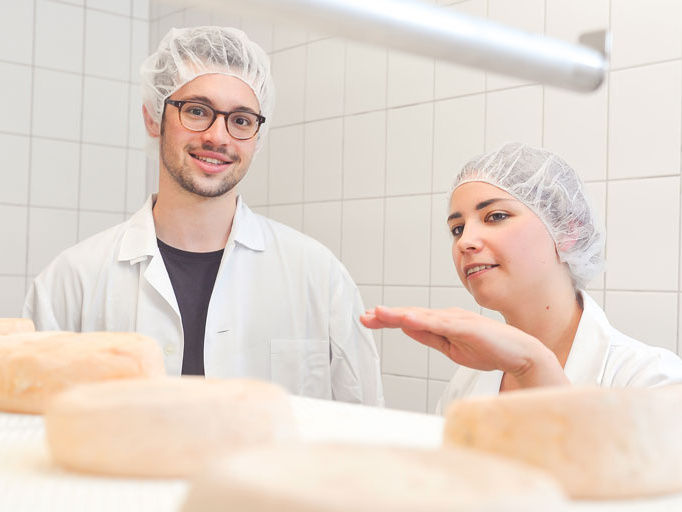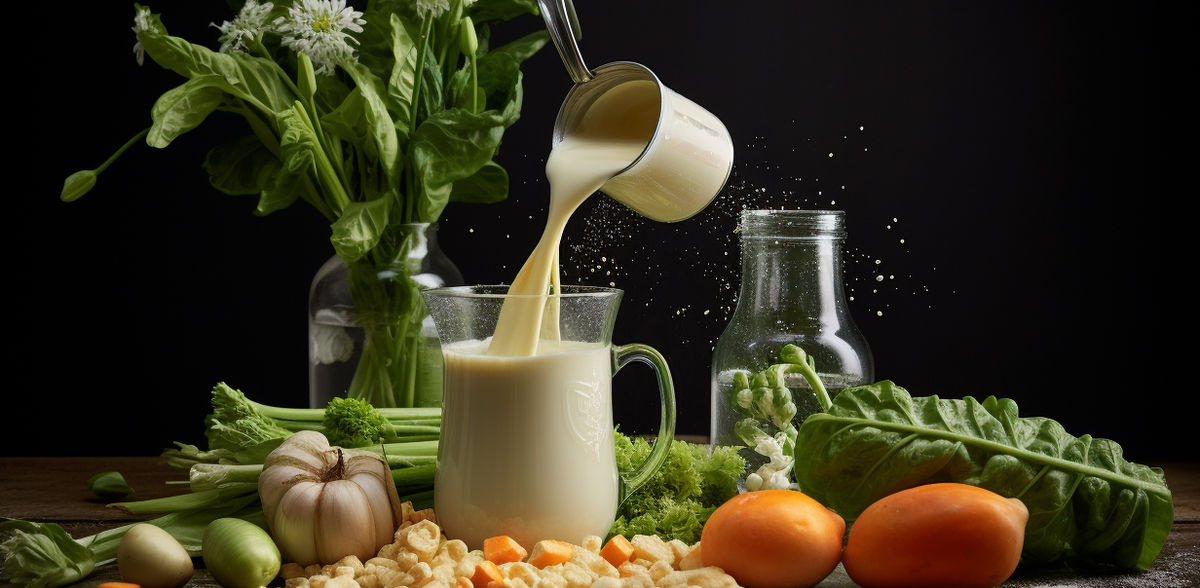Vegan trend in Europe
In Germany, milk substitute from plants is best received
Advertisement
Germany has the most active market, Southern Europe wants more variety, and people in Poland find dairy substitutes too expensive, according to a recent study by the University of Hohenheim.

Plant-based alternatives to dairy products do not have to copy the original
Universität Hohenheim / Max Kovalenko
Plant-based alternatives to dairy products do not have to copy the original - but they should have a pleasant mouthfeel and a varied product range in addition to good taste, according to the results of a recent acceptance study. To obtain the results, the University of Hohenheim in Stuttgart surveyed consumers in a total of six European countries. The results revealed major cultural differences - but also commonalities that suppliers should pay attention to.
Of all the countries surveyed, Germany has the highest sales and the greatest market potential for these plant-based alternatives. "The strong innovative power in this field is reflected in many small startup companies," explains Dr. Beate Gebhardt, head of AK BEST at the University of Hohenheim. "For example, of all the countries studied, Germany has the most new products coming to market in this field."
But so-called milk and dairy substitutes derived from plants are also becoming increasingly popular across the European market. For example, their sales in Europe increased by 49 percent between 2020 and 2022. However, according to an EU regulation, only products derived from the milking process of animals can carry designations such as "milk" or "dairy."
The plant-based alternatives to cream, quark, cheese or yogurt are made from grains, oilseeds or legumes, among other things. Due to their significantly better carbon footprint compared to their animal-based counterparts, they are seen as having the potential to promote the shift to a more sustainable food system.
Acceptance study in six European countries
Within the European market, however, the acceptance of the new products is distributed differently, knows Rebecca Hansen from the Department of Agricultural Markets at the University of Hohenheim, who investigated this issue as part of her doctoral thesis. To do so, she evaluated 3,086 responses collected as part of the project "The V-PLACE - Enabling consumer choice in vegan or vegetarian food products," funded by EIT Food, the food innovation community of the European Institute of Innovation and Technology (EIT).
It looked for differences and similarities in the willingness of people in Denmark, France, Germany, Italy, Poland and Spain to increasingly turn to plant-based "dairy" products. The six countries were selected so that at least one country in Northern, Southern, Eastern and Western Europe was represented, reflecting the different market situations in Europe for plant-based foods.
"However, the sample can only be considered representative to a limited extent," Rebecca Hansen points out. "as only people who either already consumed plant-based 'dairy' products or were toying with the idea were included in the study. People who were not interested in it at all were not included."
Germany: health, animal welfare and environment play major role
In the view of the researchers, the Germans are unique in their particularly critical attitude toward animal welfare. This, together with aspects such as health and the environment, plays a major role in deciding how often people consume plant-based "dairy products." In particular, those who have opted for a vegetarian or vegan lifestyle are 34 percent more likely to consume the plant-based alternatives more frequently.
"This confirms our assumption that the decision to consume plant-based 'dairy' products is largely determined by dietary habits," Dr. Gebhardt said. "Moreover, social norms and cultural traditions influence Germans less in this regard than people in the other countries."
Eating habits rooted in the culture of different countries
This is evidenced by the example of Poland as a kind of counterpart to Germany: there, animal dairy products are touted as healthy and beneficial overall. In the view of the scientists, this can explain the aversion to plant-based "dairy products" especially among people for whom health issues are important. However, there is also a financial factor: if the price of these foods increases, the willingness to consume them decreases. In addition, respondents in Poland often criticized the taste experience as being too sweet or too greasy.
"Nutritional behavior is a complex structure," explains Dr. Gebhardt. It is not only shaped by the individual beliefs of consumers:in conjunction with socio-demographic factors and the cultural environment, but also influenced by political programs and ecological issues."
Taste, texture and variety need to be improved
French consumers:in are also difficult to convince of plant-based dairy alternatives. Against the background that the consumption of cheese made from animal milk has a long tradition there, they seem to attach great importance to the sensory enjoyment of these foods.
A similar picture was seen in Italy and Spain: Concerns about sensory characteristics and taste prevented prospective buyers from consuming the plant-based alternatives to dairy products. In contrast, if product attributes such as price, taste, variety and also availability met respondents' requirements, the likelihood of consuming these foods on a daily basis also increased.
"As our results show, prospective customers who are just thinking about consuming plant-based 'dairy' products in particular are put off by their unconvincing product characteristics. They want more varieties and a better taste or mouthfeel," summarizes Rebecca Hansen.
Substitute products must taste good - not necessarily copy the original
"To reach more consumers:inside, manufacturers therefore need to develop products with improved recipes or more product variants. This is particularly important in Italy or France, where the importance of sensory enjoyment is culturally rooted."
In Dr. Gebhardt's experience, consumers do not necessarily expect a copy of the animal original: "However, the taste, i.e. the culinary quality of the food, must be convincing. At the same time, the product may also offer a new, independent taste experience."
More knowledge increases willingness to buy - across all educational levels
"In addition, curiosity motivates consumers to try new food products," she said. People who are fundamentally open to plant-based alternatives are more likely to maintain or even intensify their consumption of plant-based dairy products, she estimates.
What all people who consume plant-based "dairy products" or are open to them have in common is that they want information about them. Particularly consumers:inside, which attach importance to qualitatively high-quality food, go also actively on the search.
"Answers to questions like: What is the product made of? What does the production process look like? Is it healthier? Is it more sustainable? How can I prepare it? should be easy to find," the two scientists agree. In their view, easily accessible information on the packaging or at the point of sale would be best. Recommendations in dietary guidelines to consume fewer animal dairy products or scientific evidence to choose more plant-based "dairy products" could also be an important signal to consumers.
The researchers were surprised by another result of the study: "Contrary to our expectations, the level of education and other socio-demographic factors have no statistically proven influence on the frequency of consumption of plant-based dairy products," says Dr. Gebhardt.
Note: This article has been translated using a computer system without human intervention. LUMITOS offers these automatic translations to present a wider range of current news. Since this article has been translated with automatic translation, it is possible that it contains errors in vocabulary, syntax or grammar. The original article in German can be found here.





























































